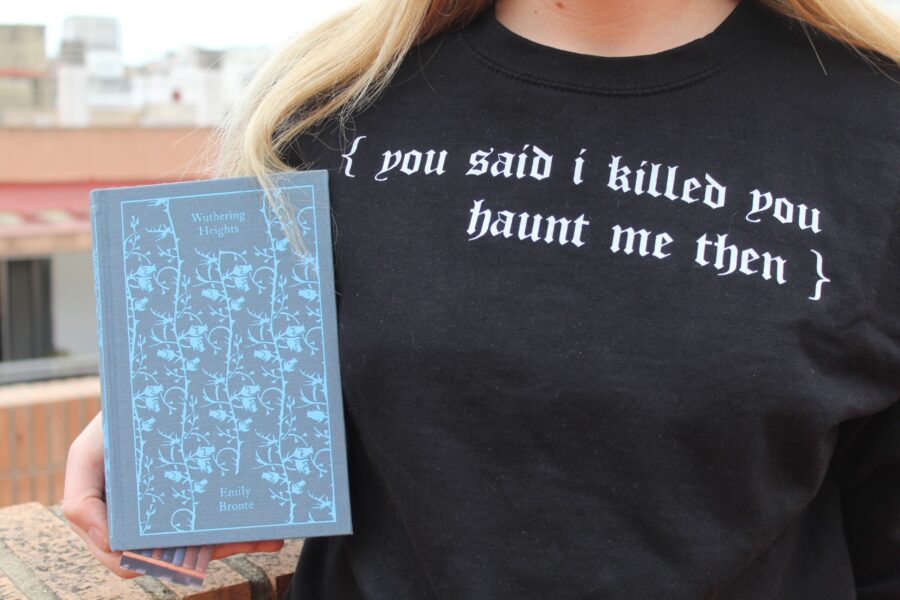If I had been unsure what my favourite book was until I read Wuthering Heights, I’ve been absolutely certain ever since. Many books have made quite an impression on me, but none of them impressed me as much as Emily’s first and only novel. Emily Brontë was a brilliant writer, and I’m sorry she didn’t get to write more books.
*This blog post contains so many spoliers that it didn’t really make sense to hide them.*
I know there are people who hate Wuthering Heights, and I think I understand why. It’s cruel on many occasions, and both main characters are pretty much mad at some point. Cathy and Heathcliff aren’t telling the story, so the reader never knows what they’re really thinking or feeling. There’s no happy ending, at least not for these two. However, I think all these facts serve the story.
In this blog post, I touch on the four main reasons I’m such a fan of this book: the frame narrative, Heathcliff, the love between Cathy and Heathcliff, and the feminist aspects of the book.
“He’s more myself than I am. Whatever our souls are made of, his and mine are the same.” – Cathy to Nelly, about Heathcliff, on the day she accepted Edgar’s marriage proposal.
“Be with me always – take any form – drive me mad! only do not leave me in this abyss, where I cannot find you! Oh, God! it is unutterable! I can not live without my life! I can not live without my soul!” – Heathcliff, freshly married to Isabella, to the dying Cathy.

The frame narrative in Wuthering Heights
First of all, the frame narrative, typical for gothic novels, is brilliant. Mr Lockwood opens the story: he leaves his new lodgings (Thrushcross Grange) to visit his landlord Mr Heathcliff in Wuthering Heights. After an unusual encounter with the unkind Heathcliff, Lockwood returns home and asks his housekeeper, Nelly, to tell him about his landlord, for whom she had previously worked. Along with Lockwood, the reader gets to hear the story of Heathcliff and Cathy, from when they were children until the present situation. Lockwood doesn’t stay at Wuthering Heights long and ends up leaving it for eight months. He takes over the story when he returns, but only until he meets Nelly, who tells him about Heathcliff’s death. Lockwood says the final few words.
Nelly is proof of how much housekeepers knew about their masters. Whether she is a trustworthy narrator or not is still being debated. She definitely influences the events, for example when she lets Cathy speak of Heathcliff when she knows he is listening, when she lets him meet her in secret, and when she doesn’t tell Edgar about Isabella’s elopement. I still think there’s no doubt that she cares for both of them in her own way. She also advises Cathy against marrying Edgar, which is the only reasonable thing to do since it’s clear that she merely likes him but doesn’t love him. The other narrator, Lockwood, is an outsider with whom anyone can identify. I can imagine myself being in his position. I would’ve thought Heathcliff was a weirdo, I would’ve been scared if I had to sleep in Cathy’s room and I would’ve definitely been curious about the family. Nelly would’ve received similar questions from me as she had from Lockwood.

Heathcliff
I think Heathcliff is one of the best characters ever written. One of the main reasons for this is the secrecy and mystery that surround him. We don’t know where he came from, how he became wealthy or what he really thinks (since he doesn’t narrate the story). There’s also the question of what he might be like had Cathy followed her heart and married him instead of Edgar. Could he have been good if he had her, if he were loved by her? Could he have loved their children like he was never able to love Linton, just because he was Isabella’s? We can only guess, and my guess is that yes, he would’ve been a better person.
Heathcliff might be a villain, but everyone who’s ever lost anyone they loved must be able to understand his pain, maybe even some of his madness. He would’ve done anything to see Cathy, talk to her again, and feel her presence. The fact that he didn’t get to spend as much time with her as he wished while she was still alive (or to be what he wanted to be to her) as well as the fact that it was then too late because she didn’t exist anymore, drove him mad and made him cruel. He lost his touch with reality, and his only hope was to meet her again, in whatever form. Good for Heathcliff that he believed in life after death or in ghosts or whatever it was that he believed in. This probably helped him survive all those years without Cathy, despite all the what-ifs and could-have-beens.
Heathcliff treats Cathy’s brother horribly, but Hindley used to treat Heathcliff horribly too. Hindley is the main reason for how things turned out for Cathy and Heathcliff. He would have never agreed to his sister marrying “the servant”, and he encouraged her to marry Edgar because of his social status. It’s understandable that Heathcliff hates him and wants revenge. At the same time, it’s horrible (especially because Hindley already got his fair share of suffering when his wife died), it’s not right, but it’s understandable. However, what he does to Isabella (and consequently to Cathy), to Linton and to Cathy’s daughter Cathy, is pure cruelty and essentially what makes him a villain.

The Love in Wuthering Heights
I’ve heard people say that Wuthering Heights isn’t a love story at all, that it’s actually about revenge and hate, and that a relationship this toxic cannot be considered love. I disagree. How can it not be about love? Just read the two quotes at the beginning of this blog post. Even better, read all of them here.
Love is complicated as it is, now imagine living in rural England at the beginning of the 19th century. Imagine your older brother plays the paternal role in your life and hates the guy that you love. Imagine that the guy you love is bad in everyone’s eyes because his skin is dark and he’s of questionable origin. Also, he has no money, and you’re a woman, which means you cannot inherit anything. How well you’ll live depends solely on who you’ll marry.
And then imagine always being frowned upon because you lack a surname and money, and your skin is too dark and you’re too dirty and your manners aren’t the best and you haven’t had a good education. Imagine that she loves you despite all this, at least you think she does. But her tyrannical brother degrades you more and more every day. And she spends less and less time with you and wears pretty dresses to see that idiot, Edgar Linton. And then you overhear her talking to the housekeeper, and she says she can never marry you, but you don’t hear the part when she says how much she loves you …
It’s all downhill from there for Cathy and Heathcliff, and yes, it’s partly their own fault, partly Nelly’s, and partly a series of unfortunate events. But most of all, it’s a consequence of their position in Victorian society. Essentially, they are victims of society’s expectations and of the inequality between men and women. But there definitely is love in Wuthering Heights, this isn’t even a question.

The Feminism in Wuthering Heights
Wuthering Heights was seen as a controversial novel when it was published in 1847. Several female characters? Strong female characters? Passion? And then it turns out that Ellis is actually Emily, which means that the author is a woman? How dare she!
Emily Bronte, who herself lived in a society in which women were highly inferior to men, expressed her own views through the novel, the plot of which is contradictory to the Victorian ideal of women. The Victorian period, surprise, was not particularly easy on women. They had to measure up to what was expected of them and be “the angel in the house”, a virtuous, feminine figure that ensured hospitality and a moral guide.
Cathy’s Transformation
As a child, Cathy can be seen as a feminist role model: independent and separated from the female norms of the period she lives in. She doesn’t care for dresses or looking pretty, all she wants to do is run around the moors with Heathcliff. There’s a conflict between who she really is on the inside and who she’s expected to be on the outside.
After their dog injures her, she’s forced to spend some weeks with the Lintons at Thrushcross Grange. She comes back looking and behaving differently – a lot more woman-like. Cathy is in her early teenage years at the time, so this may have something to do with her transformation too (many girls are more “wild”, sometimes referred to as “boyish”, as kids). She begins to spend more time with Edgar Linton and less with Heathcliff. It’s like she realises what is expected of her, how she should look and behave, and who she should focus on.
Cathy is more motivated by social ambition than by passion and love; she thinks about who she’ll be and what she’ll have if she marries Edgar. Eventually, she accepts to marry him, even though she merely likes him but doesn’t love him. She tells Nelly that marrying Heathcliff would degrade her, so he will never know that she loves him. The quality of her life and her social status depends on who she marries.
The inequality between men and women doesn’t only affect Cathy’s life; Heathcliff is disempowered because he “looks like a gipsy” and isn’t heir to any money or property. Next to Edgar, he’s not eligible, he’s an outcast, a servant to Cathy’s brother.

A Failed Marriage
Cathy marries Edgar for money, property and reputation. She even has ambitions of helping Heathcliff out financially with her husband’s money. However, both she and Heathcliff end up frustrated, unhappy with whom they married, with unfulfilled passions and desires. Cathy dies almost two decades before Heathcliff, but they are in a similar condition before their death: unable to eat, feverish and a bit mad. Cathy says “he is more myself than I am” just hours after accepting Edgar’s marriage proposal. When Cathy is dying, Heathcliff says: “Do I want to live? What kind of living will it be when you – Oh, God! would you like to lie with your soul in the grave?” Heathcliff arranges for his own body to merge with Cathy’s after death; if they didn’t get to be “one” when they were both alive, they will be eternally together in their death.
When Cathy is only eighteen, she’s pregnant, mentally and physically unwell, not on speaking terms with her husband and heartbroken because Heathcliff ran away with Isabella. When she married a wealthy man, far superior to Heathcliff in society’s eyes, she, as Heathcliff put it, betrayed her own heart. Things didn’t turn out the way she wanted them to; the money, the house and the surname Linton didn’t make her feel happy or fulfilled. She didn’t have the chance to help or save Heathcliff because he ran away and returned changed: wealthier and more powerful but hurt and in search of revenge. In the last weeks of her life, Cathy says: “I wish I were a girl again, half-savage and hardy, and free”. She longs for her childhood when she was free of society’s expectations, when she didn’t care about how she looked, how much money she had or how Heathcliff was seen by others. When she still had Heathcliff and was true to herself.
Obviously, the fact that Heathcliff and Cathy could not be together is needed to truly portray the feminine inferiority of the Victorian period. Situations like theirs (when people couldn’t marry because of their financial situation and social status) were probably common. When the novel begins, we can already see Cathy’s struggle through Lockwood’s eyes as he sees the different combinations scratched on the paint: Catherine Earnshaw, Catherine Heathcliff, Catherine Linton. Not only is this a brilliant beginning that captures the reader’s attention right away, but it also represents her inner struggle. Even as Catherine Linton, Cathy still desires to be Heathcliff’s wife and regrets her past choices.

The Hope for a Better Future
As it’s evident from Heathcliff’s and Cathy’s relationship, not only women gain by women having equal rights; men gain too. Had Cathy had the chance to marry who she really loved, Heathcliff wouldn’t have run away, Isabella wouldn’t have had to suffer, and Edgar wouldn’t have had to spend his life as a widower. Two people would never have been born, but two other people would’ve been happy instead of miserable. Heathcliff was clearly capable of gaining money and power; he would’ve done it either way. Instead of misery, revenge, jealousy and pain, there would’ve been love, independence, and courage. It’s evident that Cathy was wrong when she didn’t follow her heart, but also that the state of things didn’t leave her with many other choices.
Many readers and literary critics view Cathy’s daughter, also called Catherine/Cathy, and Hindley’s son Hareton as what Cathy and Heathcliff could’ve been had they ever got the chance to be together. Hareton is inferior to Cathy in society’s eyes too: he’s illiterate, uneducated, had bad manners and is basically Heathcliff’s servant. Cathy is from a wealthy family and has good education and good manners. Despite these obstacles and differences, Cathy follows her heart and chooses to be with Hareton, making both herself and him happy. It’s easier for Cathy than it was for her mother; there’s no older brother controlling her, while Nelly is in favour of their marriage. Also, Cathy already has experience in marrying someone whose social status is appropriate, and it wasn’t a good experience, to say the least. To a reader, who so desperately wants to see Cathy and Heathcliff together, Cathy and Hareton are a form of consolation. Also, their relationship can be interpreted as a hope for a better future, for both women and men.





5 Comments